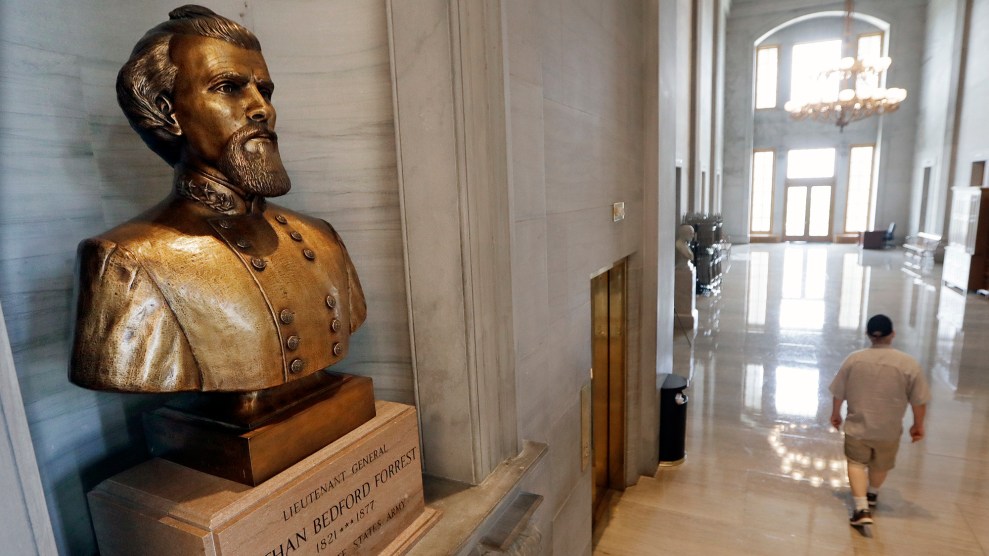
A bust of Nathan Bedford Forrest is displayed in the Tennessee State Capitol despite attempts at its removal. Photographed in August 2017. Mark Humphrey/AP
Tennessee is honoring Nathan Bedford Forrest, a slave trader, confederate general, and Ku Klux Klan leader today, according to a state law that Republican Gov. Bill Lee and his predecessors have kept in place.
Despite recent controversy around confederate monuments across the country, the state of Tennessee is today celebrating Forrest, a man who took part in slaughtering African Americans after the Civil War as the leader of the KKK and whose bust still sits in the Tennessee state capitol. According to a Tennessee law, each year the governor must sign proclamations for six state holidays, including one for Forrest, one for confederate army leader Robert E. Lee, and Confederate Memorial Day on the birthday of the confederacy’s president, Jefferson Davis.
The proclamation signed by Lee, and Republican Gov. Bill Haslam before him, calls Bedford a “recognized military figure in American history and a native Tennessean” and encourages citizens to join the governor in “this worthy observance.”
Lee said he signed the proclamation in accordance with state law and declined to say if he believes the law should change, according to the Tennessean. Lee has defended the presence of the Forrest statue in the capitol in the past, saying that removing it would “whitewash history.” Nearly four decades ago, as a college student at Auburn University, Lee participated in “Old South” parties and is pictured in his yearbook dressed as a confederate soldier, a common costume for members his fraternity, which called Robert E. Lee its “spiritual founder.” Lee has said he now regrets those activities.
Forrest was a cotton plantation owner and slave trader before the joining the Confederate Army. In 1864, troops under his command as a general massacred mostly black Union soldiers after they had surrendered. The Fort Pillow Massacre rallied union troops at the time and is remembered in history books as a war crime.
After the Civil War, Forrest was elected the first Grand Wizard of the KKK, which used violence and terrorism to suppress African Americans and stop black people from voting in the 1868 elections.
Even members of Lee’s own party believe this holiday goes too far. On Friday, Sen. Ted Cruz (R-Texas) criticized the holiday, even as he maintained his general support for maintaining confederate monuments.
American history is complicated. As a general matter, we shouldn’t be tearing down historical statues or erasing our Founders, even though they were imperfect men. But we should also provide context where we can. And, we shouldn’t be issuing proclamations today honoring Klansmen. https://t.co/RwihClP4L7
— Ted Cruz (@tedcruz) July 12, 2019












